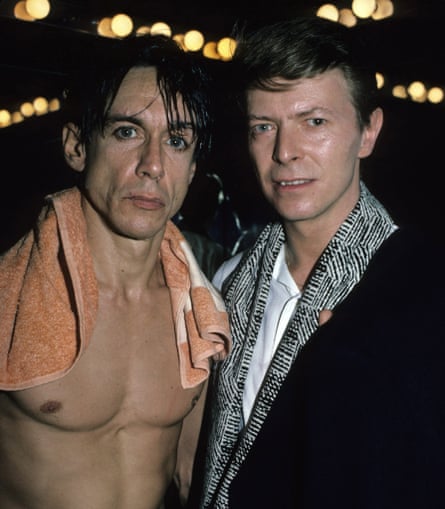1 Create a legend
Many’s the musician who played snotty and aggressive garage rock in the 1960s, singing about alienation and sexual frustration. But no one’s asking Rudy Martinez – aka Question Mark, of the Mysterians – or Barry Tashian of the Remains to deliver a lecture broadcast on national radio. And there’s a reason for that. Virtually all of Iggy’s contemporaries settled down, sooner or later, to living normal lives. Rudy Martinez did not spend his life making sure everyone, but everyone, thought of him as Question Mark. James Osterberg, however, turned himself into a walking, talking, topless, drawling piece of art, known as Iggy Pop. He has always been Iggy Pop. At this point, really, he’s as much musical Mount Rushmore as he is man.
2 Don’t stop
Iggy never let himself be stopped by the fact that, for large parts of his career, no one was interested in the music he was making. If an album was rubbish and no one bought it, then it was rubbish and no one bought it. Sooner or later he’d make a good one again, and a new generation of music lovers would fall for him. And so his legend would be replenished.
3 Live the wild life
That helps for keeping people interested even when the music’s nothing to write home about. Don’t want to talk about the album? Let’s talk about the time he covered himself with peanut butter and threw himself into the audience, or the time he lacerated himself, or the drugs, or the nudity. If you can manage to release a certifiably terrible album that manages to get people talking in awed terms, so much the better, and Iggy did that with the Stooges’ live album Metallic KO, described by Lester Bangs as “the only rock album I know where you can actually hear hurled beer bottles breaking against guitar strings”.

4 But make sure there actually is some good music
Without that, you just become another disgusting footnote to rock history: GG Allin, in other words. But Iggy has five cast-iron classic albums to fall back on: the three official Stooges studio albums from their first time round, plus Lust for Life and The Idiot from his solo years. If punk hadn’t happened, he might have been written out of pop history, but it did, and he wasn’t. In fact, if anything, his role in musical history might be rather overstated, for the Stooges were nothing if not a perfect, unextendable dead end of nihilism.
5 Have the right friends
Most of your heroin-addicted musicians without a record deal and a history of unreliability behind them tend to end up being dropped like a stone, rather than successfully rehabilitated (in terms of reputation, if not physical condition). But then most of them don’t have someone of the stature of David Bowie to prop them up. Admittedly, when they became friends in the 70s they were as bad as each other, but even when Bowie was living on a diet of milk, peppers and cocaine he remained an A-list star, so his endorsement shored up Iggy’s status. He then helped produce The Idiot and Lust for Life, played piano in Iggy’s touring band, and a few years later – when Iggy was short of a few bob – covered The Idiot’s China Girl and released it as a single. Bowie would later produce Iggy’s most commercially successful album to date, 1986’s Blah Blah Blah.

6 If you’ve had enough of being an underground hero, chase success
That’s what Iggy did with Blah Blah Blah, whose lead single Real Wild Child (Wild One) was a cover of an old rock’n’roll number by Johnny O’Keefe. This iteration of Iggy was so comparatively safe that the most violent complaints about him were about him not making any effort to mime properly on Top of the Pops. From this point on, he was no longer the neighbourhood threat, but the acceptable pantomime face of the underground.
7 Become a beloved entertainer
Iggy has become far more than just a rock singer. He has starred in an opera; appeared on Star Trek: Deep Space Nine; voiced cartoon characters; provided dialogue for video games; acted in indie films; written about Edward Gibbon’s The Decline and Fall of the Roman Empire. And, of course, been the frontman for TV ads for insurance. People’s first thought about Iggy these days is not: drug-addled, self-harming, menace to society.

8 Make your music respectable, too
Iggy’s 2009 album Préliminaires was not one anyone expected. He was “sick of listening to idiot thugs with guitars banging out crappy music”, so he made a quiet, jazz-inflected album, inspired by the novelist Michel Houellebecq. Then, in 2012, he followed it with Aprés, featuring his takes on – among others – Piaf, Gainsbourg, Cole Porter and Sinatra. Look, the records seemed to say, I’ve grown up. I can be trusted.
9 But keep the legacy alive
By reuniting the Stooges, Iggy ensured that no matter the insurance ads or the cartoon voiceovers, or the sometimes-ropey-albums of new music, he could forever be remembered for what he had been. But instead of the Stooges playing to a few hundred people and being roundly jeered, they were greeted as conquering heroes, playing to sold out houses and adoring critics. Finally, every strand of Iggy’s career – the legend, the entertainer, the punk, the statesman, the underground hero, the rock star – could come together in one. This is the Iggy the BBC have recruited: the man who represents everything because he has done everything.
10 Be bright
The crucial part. Because, no matter the records, no one would care what Iggy Pop had to say if they didn’t think it might be interesting.

Comments (…)
Sign in or create your Guardian account to join the discussion